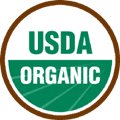Organic
We would like to take just a moment to talk about organic foods and, we hope, take some of the mystery out of the whole situation.
1. What does "organic" mean?
In the United States, organic food is "certified organic" or it can't be labeled organic.

To get the certification, certain procedures have to be followed. You can read more about US certified organic foods and certification procedures here.
And here's a great article from Wikipedia.
2. What's the difference between organic and non-organic foods?
a. the food -- it's grown/produced to different standards, as discussed above
b. the working conditions -- since no scary pesticides are used, workers are not exposed to scary pesticides
c. the environment -- since no scary pesticides are used, the planet is not exposed to scary pesticides
A few points:
- Organic farms do not release synthetic pesticides or herbicides into the environment. Some pesticides and herbicides have the potential to harm local wildlife.
- Organic farms are better than conventional farms at sustaining diverse ecosystems of plants and insects, as well as animals.
- When calculated either per unit area or per unit of yield, organic farms use less energy and produce less waste (such as packaging materials for chemicals, among other things).
3. Our suggestion: buy one organic thing every time you shop.
a. it shows that you're interested (and will bring prices down! and then we'll all have more choices)
b. try different organic things and see how they are different (maybe frozen organic strawberries this time. what do you think?!)
4. The organics we buy
a. Always:
i. Sugar
ii. Bananas
(These are both because of reasons associated with 3b. We can tell you a lot more about what happens to people who are harvesting non-organic sugar and bananas, but unless you like sad movies, etc. you might just want to take our word for it.)
b. Sometimes: fruit, vegetables, lettuce, cheese, rice, flour, cornmeal, prepared foods (like Annie's and Amy's Kitchen), and, for CurlyHairDay, meat.
Now, that wasn't so bad, was it?!

2 Comments:
Yes, Raccoonteur, I am definitely a milk drinker! While I was in school at Chapel Hill, I got hooked on the local Maple View Farms' dairy products, which were in all the stores right alongside everything else. Little did I know that what I was consuming was non-bgh and nearly-organic...and when I moved away and bought the other stuff, it tasted like medicine! So now it's all organic milk at our house. I know SmallBean always buys organic butter, too. I usually do, but I sometimes buy Plugra (a European butter) because it is ultrafantastic.
Very interesting article, Scott! We agree with the theory that the longer that it's in your body, the longer it effects you, so meat and dairy are high-up on our organic lists. Another great way to "watch what you eat," which I do with cheese, is to buy from small producers, even if they're not organic. They know what they're using and, chances are, are using artisinal, non-harmful methods...and the cheese are delicious. :)
Post a Comment
<< Home